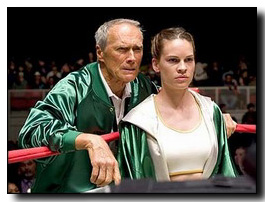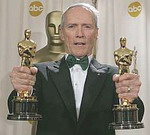Seeing Million Dollar Baby From My Wheelchair
- DIANE COLEMAN
Many people have told me that they don't think they could "stand to live" if they needed a wheelchair like me. That's why I felt a little queasy about going to see Million Dollar Baby. But helping plan the first disability protest of the movie, in Chicago, I had a duty to see it.
 |
But my preparation was more than that. When I grew up, through braces and surgeries, my elementary school teachers called me "Mary Sunshine." When I completed UCLA law school from a motorized wheelchair, I was called "inspirational." I took it as the highest compliment to be told by some non-disabled person that they "didn't think of" me as "handicapped." When I was excluded or rejected in my work or social life, I could always understand the other's perspective.
Even the few times someone would actually say they would rather be dead than be like me, I would just politely forge on.
In my early thirties, sharing experiences with disabled friends, I finally learned how to recognize and constructively resist discrimination. The connection and insights we shared gave me a new lens through which to view my life. Most importantly, I learned to look more clearly at the ways I had internalized the stigma and shame of disability, and began the lifelong struggle to undo the damage done by growing up in isolation from a true sense of community and mutual respect.
In short, a "Jerry's Kid" became a "telethon protester." Over the last two decades of involvement in the disability rights movement, I have faced arrest many times in non-violent protest to help win the right to ride the bus, and the right to not be forced into a nursing home because of the need for assistance to live. During Kevorkian's heyday in assisting the suicides of middle-aged disabled women, I founded a national disability rights group called Not Dead Yet. Using a ventilator at night since 2002, it's become even more personal.
I came into the theater, wanting to flee quickly when Million Dollar Baby was over. I sat through the whole movie without removing my coat, scarf, hat or gloves.
Queasy stomach, wish to flee not typical for me anymore. Moreover, the threat of assisted suicide and euthanasia are daily fare for Not Dead Yet. We fight to be heard over the loud voices of players on both sides whose interests should be readily seen as, at best, secondary to the organized voice of those society says are "better off dead." So many of us have died too young, never getting a real chance to live.
In the midst of all that reality, what makes a fictional movie like Million Dollar Baby so disturbing that I want to flee?
As I watched, I thought about the impact the movie would have on severely disabled people surrounded only by doctors, nurses and mixed up, grieving family and friends.
|
Million Dollar Baby |
|
"Clint Eastwood's Million Dollar Baby is a masterpiece, pure and simple, deep and true."- Roger Ebert, Chicago Sun-Times "This movie is a corny, melodramatic assault on people with disabilities. It plays out killing as a romantic fantasy and gives emotional life to the 'better dead than disabled' mindset lurking in the heart of the typical (read: nondisabled) audience member." - Stephen Drake, Not Dead Yet (Million Dollar Baby won four Oscars: best picture, best actress, best supporting actor and best director.) |
It took me another week to get in touch with my deeper personal discomfort.
Could people imagine a happy and meaningful life for me? Could they see that I am not living a fate worse than death?
But now I am forced to see how critics and audiences love this movie, resent our anger, and extol the virtues of open public discussion of euthanasia based on disability. My fantasy is ripped away.
If I'd been truly prepared, I'd have brought a sign to hold up, saying, "I Am Not Better Off Dead." I would have looked into every face exiting the theater, insisting that they see me, and this simple yet apparently incomprehensible message.
 This is J. Fraser Field, Founder of CERC. I hope you appreciated this piece. We curate these articles especially for believers like you.
This is J. Fraser Field, Founder of CERC. I hope you appreciated this piece. We curate these articles especially for believers like you.
Please show your appreciation by making a $3 donation. CERC is entirely reader supported.

Acknowledgement
Diane Coleman. "Seeing Million Dollar Baby From My Wheelchair." Not Dead Yet (1996).
Reprinted with permission.



